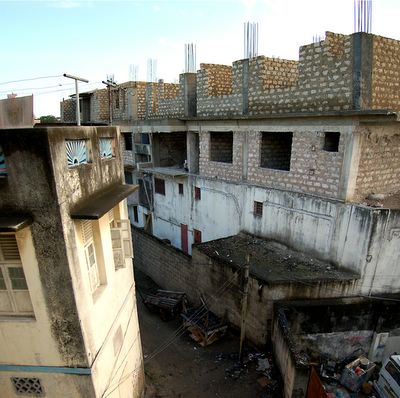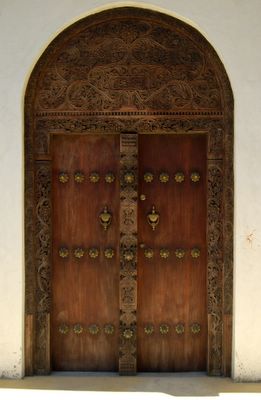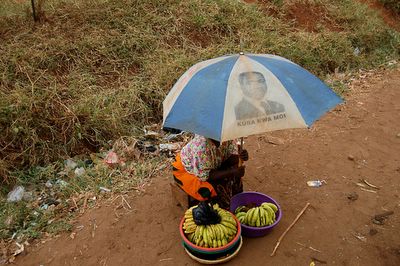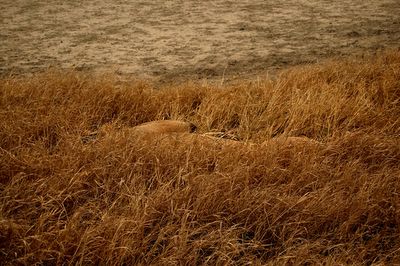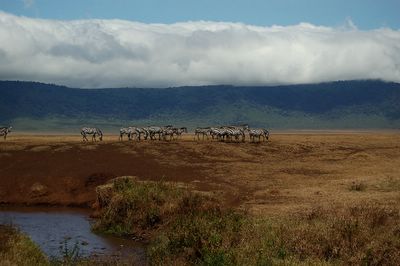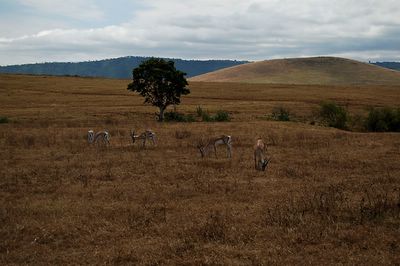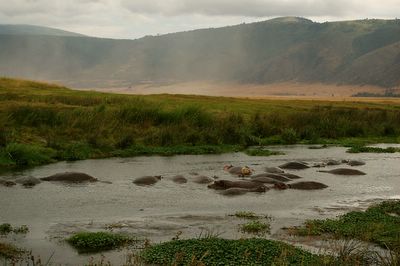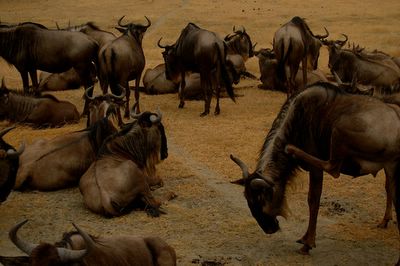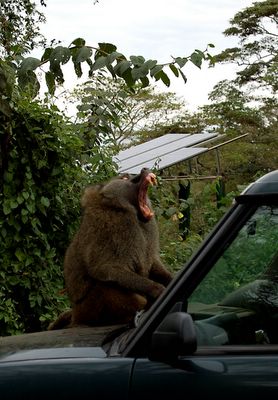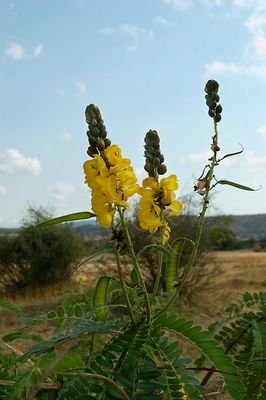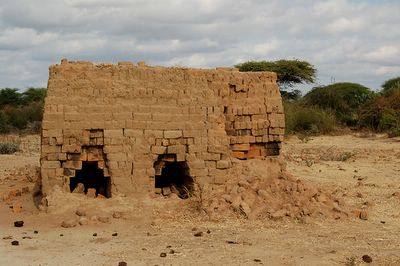
Taxi drivers dashboard, our transport to beach retreat from Mombasa
Dear all,
I am no longer in
Soon after returning to our home-sweet mud-and-dung-hut in Arusha from Machame we left again. This time we were setting out on the field trip of my dreams. Let me preface. In University I took two courses (all I could take) specifically on this one society, their culture, beliefs, practices, etc... They are one of the most visible of all East African societies, most people have heard of them, many have seen a picture representing them, some have seen films, they're called the Maasai. Our second field trip was to an even higher up village, far away from anything we might label 'developed', not the least bit tropical, inhabited by Maasai, and called Eluai. Eluai is the boma (homestead) of Lesikar Eno lengila's father, his wives and many children. Lesikar is Gemma's (the woman in charge of our summer school) husband. We stayed up there for three days and witnessed much no tourist would ever see even though there are Maasai boma's scattered across the landscape of Kenya and Tanzania that offer tourists a glimpse of "traditional" culture. The Maasai will sing and dance for the tourists and what they sing, what the tourists don't know, is; "Welcome tourists, give us your money". It's probably an incredible experience anyway and I'm sure the Maasai are making a pretty penny, a lot of what I saw and did probably wouldn't be too salable.
We began by touring some of the houses, which are built of mud, dung and straw packed onto a stick frame. They are very well insulated the way they're built and the temperature inside remains pretty constant, which was good because it was down right cold up there. The houses are round (which is actually a style of buildling adopted from more settled neighboring tribes) and the entrance enters on to either one large room or spirals into a small central room with little rooms built off the the sides. The second style reminds of something like a conch shell, with little compartments coming off the spiral. Inside it is extremely smoky and nearly completely dark. They have their cook fires inside and no real ventilation, many of the women had pretty awful coughs and it wasn't surprising.
We milked goats and cows, cows are easier but we were pretty retched at it nevertheless.
We hiked into a secluded wooded area which is the site of a ceremony called olpul that is a kind of Maasai hospital. Warriors often will go there and eat nothing but meat for a few days to recuperate after stressful times or after being circumcised. Occasionally men will take their wives after childbirth but it is rarer and rarer. Part of the reason why it's becoming rarer is because at olpul you would sacrifice a goat and make a medicinal soup, but livestock numbers are lower these days than they used to be and people are not so likely to sacrifice animals so often. They did sacrifice a goat for our benefit though, which was an honor as well as a difficult thing to watch. Not everyone wanted to watch but most of us watched the whole business which was a little gruesome but it was a good experience to see where one's food comes from. I tasted the blood, tried some goat meat cooked over open flame, and I'm wearing a bit of it's skin round my hand, which fortunately has stopped smelling like rotting flesh and has just dried out. Sleeping in my tent there was an experience in itself up there. You could hear the cow bells ringing, early at night there would be dancing and singing coming from outside the houses, and occasionally you'd hear the hyena's howling. Hyena howls are very unnerving. One night I was back to my tent to get my headlamp and these little kids were sort of half guiding me half laughing at my apparent silliness and in the light of the torch, not far off I could see a hyena's eyes circling our tent campsite. I wasn't really frightened just sort of mesmerized and then the kids started sayings something and throwing rocks, it left. I asked Lesikar what the kids had been saying afterward, figured it was hyena, and he said it meant leopard and that they were trying to tease me.
We spent most of one whole day hanging out at the local women's cultural center, which is some half built houses in the middle of a field, and watched them do their beadwork. They showed us how to twist the fibers from plastic rice sacked into thread and then how to make simple strands. The women who was helping me must have thought I had bad taste in colours because she kept un-stringing my work and redoing it with different colours. They had some absolutely beautiful jewelry and they wore a lot of it. I'm writing quite a bit about Eluai and I should probably restrain myself and save my words for a longer piece I hope to write when I get home but as I said this was the field trip of my dreams. I'll be briefer. At Eluai we also participated in one of the nighttime Maasai disco's which was hilarious because we were so silly looking. At the dance the men and women are in different groups, the women dance by sort of bobbing and rolling their shoulders to make their disc-like necklaces bounce up and down, and the men compete at how high they can jump. They can jump really high. Then they all come together and the women choose the men who they think jumped the best. At one time, at this point in the dance they would all then go off and have sex, this practice is becoming much less common thanks to AIDS education, and fortunate for me because I think I chose like three different men. In short, Eluai was completely amazing and I wished I could stay.
However, we again returned to Arusha were there only about a day before we were off again. This last field trip was much stranger than the others and nobody seemed to understand what was going on half the time. On the way to this village we stopped for a night someplace and camped by a lake. A few of us were walking along the lake and we came across these fishermen who offered to take us out in the dugout canoes to see the hippos. This sounded a little dangerous but our sense of adventure got the better of us and we went. We saw hippos, it was great, they make strange noises and are really really big. On each of our trips we had a couple of people from the Aang Serian organization who were our guides basically. On this one we had this guy Shobani. Shobani doesn't understand English all that well and takes a long time to say anything but he's very sweet. He can also be very odd and doesn't make much sense himself, the only frustrating bit is that if he doesn't understand you he'll just assume what you said and go on rather than asking for clarification, this made it very very confusing to ask questions. We survived though. We were visiting his village in Rangiland it was called Kalema in more central
When I was gold prospecting out in
Returning from Kalema was essentially the end of our program, we had a day safari to Ngorongoro the next day and that was incredible. Ngorongoro is a crater at the top of what used to be a mountain that one day blew its top. Inside the crater is a nearly captive community of all the great African wildlife save giraffes which really can't get into the crater. It's absolutely stunning inside and from the crater rim and we saw all the animals even the rhino's which apparently are very rare. It was strange to be in a tourist place after all we'd done and see all the funny looking white people but it was a lot of fun. That night we had a sort of closing ceremony and most of us left the next morning. Even now, back in
At the end of our program a number of us traveled by bus to
Some more long days of traveling and now I'm here again, in white people land, feeling at once as though I never left and I'm not really here. Trips like this, that are so different from our normal lives in my experience fade quickly from memory and start to feel like dreams. I'm so grateful to have kept a detailed diary every night of my trip this time and I look forward to getting home and rewriting it. I hope to produce something between a travelogue and an academic report which is to say something accurate and respectful but interesting and easy to read. I may have a college degree now but for a number of reasons I would not consider myself an academic and I hope that my writing errs more on the side of travelogue than report. For instance, I absolutely hate being told not to write in first person, that it's unprofessional. Personally I think NOT writing in first person is unprofessional, as long as the only reason not to is so called posterity. Writing as though ones words are fact ignores the personal experience of the author and that expereince inevitably colours what is written. I don't believe there is such a thing as impartiality or objectivity and I blame the prohibition on first person for prolonging such myths! Anyway, I have grand ideas for my writing and very high expectations for it and for myself. Also I hope that the time put into writing it and the rereading of my journal will help to preserve my memmory of the trip. I imagine my hundreds of photographs will help as well.
This email is getting quite long now and I should save some things for the telling since I'll be home in a week. I have learned that I'm moving the weekend I get back so I might not see many of you for a few days unless you aren't bothered to see me in a jet lagged, sleep deprived, exhausted zombie state. I'm looking very forward to seeing you all and seeing my puppies and my binsi tree and my new house for that matter. I also look forward to seeing Pirates of the Carribean which came out the day I left much to my dismay, I get to go see it with my mommy on Sunday, awhhh. Congratulations to you if you've managed to make it through this whole email (a nod to the yotamalogue). See you soon! Cheers from
Morgan


